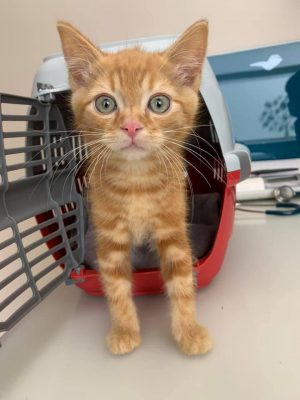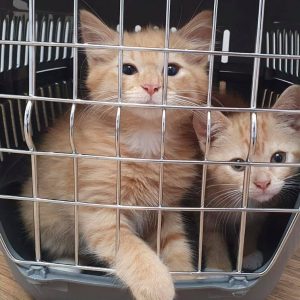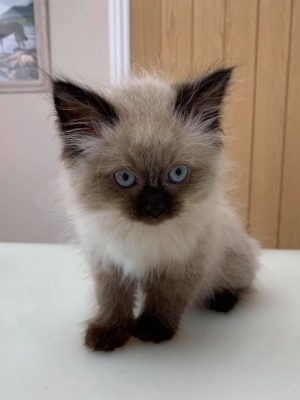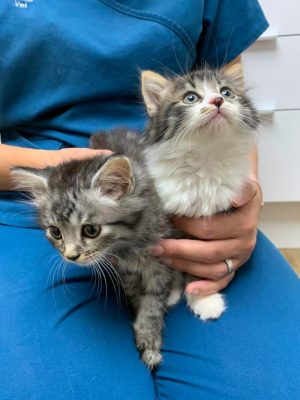Kittens
We hope your new addition is settling into the family well. To get them off to the best start here is a little more information on a few of the basic healthcare tips.
You can also download a printable Children and their new kitten booklet, which is great for helping children understand how to look after and care for their new pet.
Parasite control
Flea, tick and worming treatments are given regularly throughout your pet’s life to ensure both your pet and human family members are protected from these common parasites.
Worms can pass from the mother cat to her kittens in her milk and so it is important that kittens are wormed regularly.
When kittens first visit us at 9 weeks old, we normally use a spot-on treatment which covers fleas and worms.
At their second vaccination around 13 weeks old, most kittens are big enough for the longer acting treatments which provide protection for 3 months.
We use Bravecto spot on for fleas and ticks and either a tablet (Milbemax) or spot-on (Profender) worming treatment
Neutering
Neutering (spaying in females and castration in males) is recommended from 4 months old in both sexes to prevent unwanted mating and unexpected litters. Neutering can also prevent male cats straying far away from home and picking up infectious diseases by fighting with others. We recommend neutering your kitten before allowing them outside unsupervised.
Microchipping
It is UK law that all cats must be microchipped by the age of 20 weeks old and this microchip must be registered with the national database.
May cats dislike wearing a collar or it can be lost while they are outside adventuring! A microchip is the most reliable way to identify and reunite a cat with their owner and we strongly recommend that all cats are microchipped before they are allowed to go outside. Sadly we often have lost or injured cats brought into Mulberry House and if they don’t have a microchip, or if the details are not up to date, it can be very difficult to find their owners.
The microchip is a tiny identification device the size of a grain of rice which contains a unique number that is linked to the pet owner’s contact details. Inserting the microchip is a quick and easy process with an injection under the skin on the back of the neck.
Microchip placement is included free of charge for Mulberry Club members.
Diet
Cats are obligate carnivores which means they must have a meat source of high quality protein in their daily diet. For our domestic pet cats this can be commercially available wet pouch or tinned food and dry kibble biscuits.
Commercial cat foods are manufactured to be complete, balanced and provide at least the minimum requirements of the essential nutrients your cat will require at that particular stage of their life.
It is very important that young cats up to 12 months old are fed a specific kitten diet which has all the nutrients their growing bodies need.
In the wild, cats will eat about ten small meals (rodents or birds) over a 24 hour period. To keep your cat’s feeding regime as natural as possible and prevent boredom and obesity, you can use puzzle feeders and split your cats daily ration into five small meals throughout the day and night.
Basic Cat care
Cats should have access to clean water daily. Water should be given in either glass or ceramic bowls. Food and water bowls should be kept apart.
Litter trays should be kept in a quiet place where your cat can comfortably toilet with peace and quiet. The rule of thumb for litter trays is that you should have one litter tray per cat plus one.
Cats should have plenty of hiding places provided up high where they can get away and feel safe.
You should try to encourage play with your cat, and there are many ways to do this e.g. use toys, food mazes, catnip toys, laser pens. This is especially important for indoor cats.




Find Us
Opening Hours
- Monday - Friday8:30 - 18:30
- SaturdayClosed
- SundayClosed
- Bank HolidaysClosed
Opening Hours
- Monday - Friday8:30 - 18:30
- Saturday8:30 - 14:00
- SundayClosed
- Bank HolidaysClosed
Emergencies
If you have any concerns about your pet's health while we are closed, please call our our of hours emergency providers, Medivet 24 Hour Wokingham on:
01189 790 551
Book an
appointment
We know how busy life can be. Online appointment booking available 24/7.
Book appointmentEmergencies
If you have any concerns about your pet's health while we are closed, please call our our of hours emergency providers, MiNightVet on:
0118 973 3466


